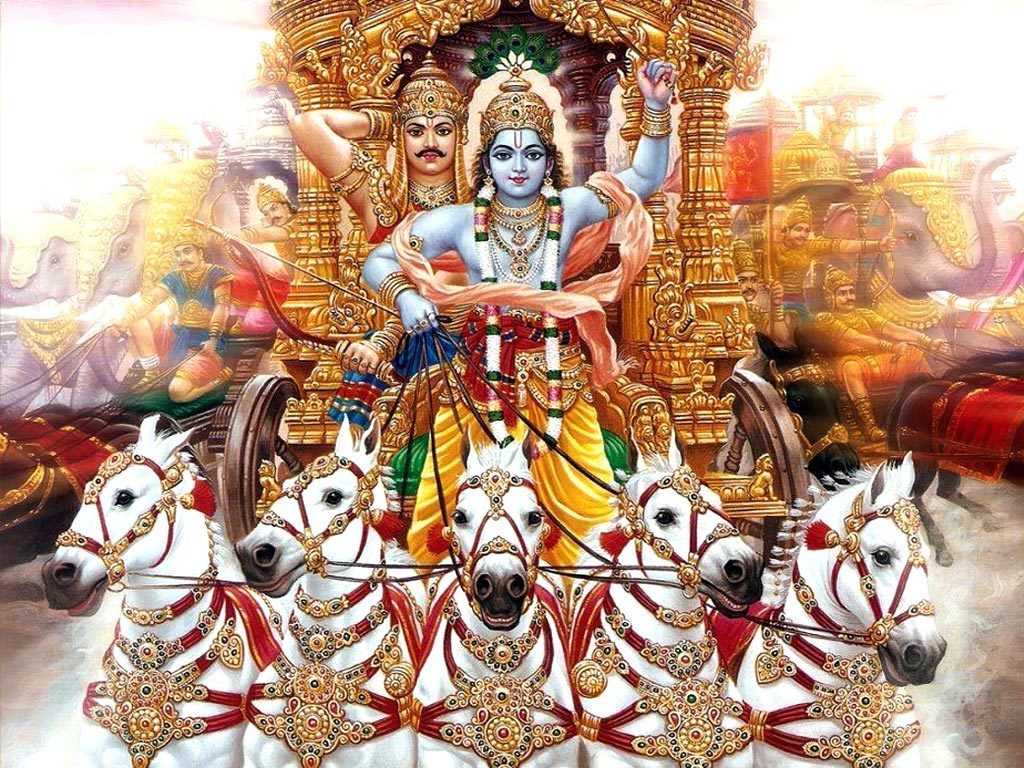The strength to face the challenges in our life always rewards us with a refinement and evolution of our soul regardless if we win or lose the battle.
We all strive to live our soul’s purpose, but sometimes our mind conflicts with our feelings and causes confusion. The Bhagavad Gita is an ancient Hindu text that has an important teaching for those of us who experience this internal struggle. In this story, Arjuna the peaceful warrior is faced with a choice to act or not act in what he feels is a no-win situation for himself. If you have ever felt confusion or inner conflict holding you back, then the timeless wisdom in this story can bring clarity and relief.
Ahimsa is the principle of nonviolence, which is a fundamental tenet of Hinduism. It is rooted in the belief that all lives, both human and non-human, are sacred. This is why on the eve of a great war, the choice between duty and non-violence leaves Arjuna in a state of inner conflict in this story. Being a peaceful warrior requires you to stand firmly in your spiritual path, dharma, but sometimes we don’t have the clarity to know what the best choice is. This requires an active fearlessness and non-attachment, which is embodied in the famous parable of Arjuna and Krishna’s discussion on the battlefield.

The story begins with a young prince, Arjuna, who realizes that the enemies he’ll be fighting in an upcoming battle are his own relatives, beloved friends, and revered teachers. He turns to his charioteer confessing his conflicting emotions and his fears. His charioteer is actually the eternally wise Krishna. Here Arjuna talks to Krishna about his confusion:
…it is not proper for us to kill our own kinsmen, the sons of Dhritarashtra. For how, Krishna, shall we be happy after killing our own relatives? If the sons of Dhritarashtra, weapon in hand, should kill me in battle, me weaponless and not defending myself, that would be better for me. – Bhagavad Gita
As he contemplates no action at all and allowing his enemies to kill him, he hopes to stay true to his dedication to non-violence (ahimsa), but Krishna recognizes this as a cop-out. Compassion is said to come in the form of a lamb and a lion. We must accept that we are not perfect. This humility allows each of us to evolve forward from the place that we stand, rather than jump to absolute ideals.
Though Arjuna has mentally justified that he is being fearless and selfless to let his enemies kill him unarmed, he is actually avoiding his own dharma and here Krishna reminds him of this:
One’s own duty, though defective, is better than another’s duty well performed. – Bhagavad Gita
This is a call to hone one’s own inner voice and stay true to it; trusting that there are no wrong choices, only lessons to be learned. Duty is usually associated with something we don’t want to do, but it can feel quite empowering once we accept our role in a situation. When I was in my 20s, I was passionate about the environment and saving the world, but I was broke. I had gone past being able to be picky about a job that would help me pay the bills or feed myself, so I begrudgingly took a job as a landscaper.
Swinging a pick-axe in the hot sun, I was given the task of putting irrigation lines in to grow plants and grass that should not have been planted in the arid climate of Arizona. Non-native, drought-tolerant plants waste precious water in the desert landscape. I was miserable while I worked and felt a bit self-righteous about my sustainability ideals. Angry at the universe that I should have to do such a lowly chore, I put my nose to the grindstone and woke up early every day to make ends meet.
If you have ever felt conflicted about your life path then you will understand this feeling. In acceptance of the task at hand comes a certain humility, self-compassion, a sense of service, mental liberation, and even empowerment. This is central to karma yoga, which teaches us not to be attached to the outcome of our work, but to do it as a form of devotion to our own inner evolution.

Your business is with action alone; not by any means with the fruit of action. Let not the fruit of action be your motive to action. Let not your attachment be fixed on inaction.Therefore, always perform action, which must be performed, without attachment. For a man, performing action without attachment attains the Supreme. – Krishna to Arjuna
Even the most mundane actions in our day-to-day life are the result of choices we have made. The parable of Arjuna’s indecision on the battlefield is an extreme expression of this common circumstance and that is why it holds such value for us today. With clarity of mind, or mindfulness, along with personal accountability and non-attachment to outcome, we can have the courage to face any battle. A situation can be terrifying and feel like life or death even if it is not. The strength to face the challenges in our life always rewards us with a refinement and evolution of our soul, regardless if we win or lose the battle.
To one that is born, death is certain; and to one that dies, birth is certain. Therefore, you should not grieve about things that are unavoidable. – Krishna to Arjuna
Sometimes it is the fear itself that dies (or an ego death) on this journey. Each one of us is here at this time for something greater than we can know or understand. The world is filled with terrifying possibilities, and mistakes are easy to come by. Sometimes the fear of making the wrong choice is more scary than the choices themselves, yet we are all here to fail as much as we are here to succeed.
Anyone with great success can also boast many failures. In this process, we learn to be more compassionate to ourselves and to those who have wronged us with their own poor behavior. The journey of soul evolution continues regardless. We must always put one foot in front of the other, and the path will appear with each step.
In this path to final emancipation, nothing that is commenced becomes wasted effort; no obstacles exist; and even a little of this form of sacred duty protects one from great danger. – Krishna to Arjuna
Knowing that we are in line with our dharma, and on the path (not the right path or the wrong path, just on the path), we begin to liberate and empower ourselves. These ancient parables, like the one told in the Bhagavad Gita, are meant to remind us of the eternal challenges that humans face and how to conquer our demons, even if we’d rather do nothing. Arjuna contemplates not taking up arms in battle, but after speaking with Krishna he follows his dharma and fights.
Being a peaceful warrior does not mean that you should be without your sword, as you never know when you might be called to unsheathe it. You can stand fearlessly in whatever circumstance you may face, knowing that you are not alone on the journey to personal evolution.
*If you are enjoying Culture Collective and would like to become a patron, please visit here!*


